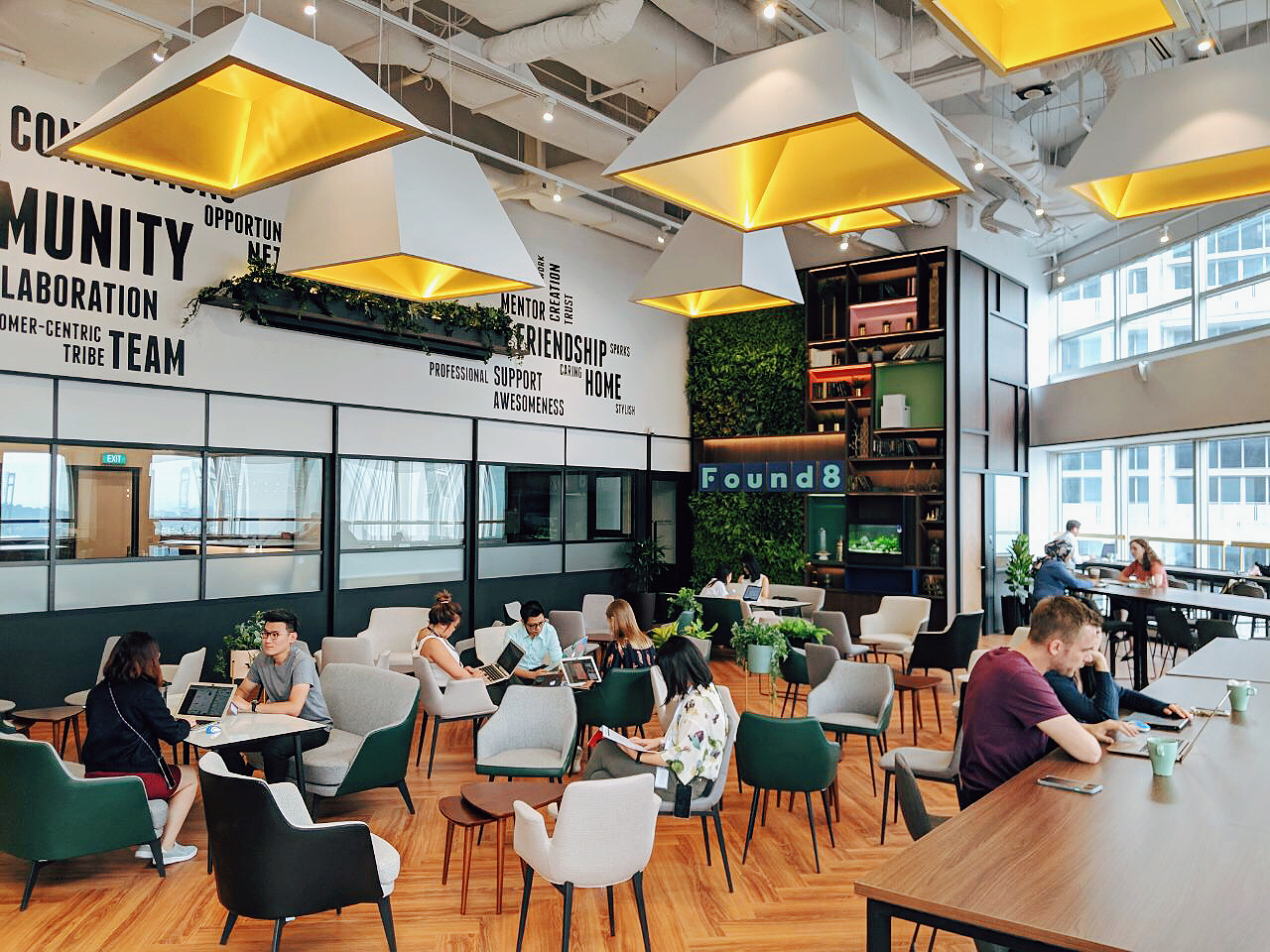What began as flexible shared office facilities for start-ups has quickly become the new normal in Singapore. Commonly known as the co-working space, the market has soared.
By 2030, 30% of total commercial real estate in the region will be co-working spaces, with an estimated US$30 billion in market value, according to Flyspaces, an online booking platform for flexible workspaces in South-East Asia.
Estimates from FlySpaces show that currently this market segment forms about 5% of total office space and is worth around S$3.2 billion (US$2.36 billion).
Initial demand for co-working space came from start-ups. Now enterprises are also turning to them, attracted by the flexibility in size of office space, networking opportunities and the opportunity to plug into the innovation community, says Guillaume Martin, Co-Founder of FlySpaces.
By 2030, 30% of total commercial real estate will be co-working spaces, with an estimated US$30 billion market worth.
Kong Wan Sing, Founder and CEO of homegrown co-working operator JustCo, says that large corporate clients are beginning to recognise the value of flexible office space.
Besides, millennials are attracted to co-working environments with floor-to-ceiling windows, free flow of espressos, comfy sofas, complimentary wi-fi, networking events and the chance to engage with like-minded people.
Research shows that large companies like Verizon and have taken up just over half the total office space last year, according to real estate consulting firm Edmund Tie & Company.
Its 2018, research on this market highlights that cost savings from using a co-working space is the most apparent in Singapore’s CBD, where savings can amount to approximately 50% compared with costs for traditional office space.
Millennials are attracted to co-working environments with floor-to-ceiling windows, free flow of espressos, comfy sofas, complimentary wi-fi, networking events and the chance to engage with like-minded people.
The shared amenities are also appealing. Tan Geok Leng, CEO of AI/fintech start-up Aida Technologies, says the cost-effectiveness of “shared amenities and the presentable working environment that is good enough to host banking and insurance industry executives are the key reasons why my start-up is based in The Great Room co-working space”.
There are about 120 co-working space operators in Singapore. They include homegrown brand JustCo, with its more than 14 locations, and global co-working space pioneer WeWork with 11 locations. Many of the operators are also expanding quickly into neighbouring South-East Asian countries, according to Edmund Tie & Company research.
Upward spiral leading to specialisation
Entrepreneur Hugh Mason, who was a Co-Founder of Singapore’s first co-working space called Hackerspace in 2009, observed that the market is maturing. “You can see step-by-step a new concept, evolving organically and happening quite quickly,” says Mason.
Instead of just co-working space, operators are differentiating themselves to stand out from the crowded market. The Singapore co-working hub 80RR caters to the fintech industry.
For the creative industry, including retail and fashion design, there is Spaces. Found8 focuses on corporate innovation with the aim to help enterprises cultivate an innovation mindset.
“People’s real desire in going to a co-working facility is not for the desks and chairs but to be with a like-minded community.” – Hackerspace Founder and Entrepreneur Hugh Mason
Not every co-working space is for the digital world. A*StartCentral supports biotech entrepreneurs with lab facilities. Instead of beer and coffee bars, A*StartCentral provides high-end microscopes, centrifuges, molecular biology kits, autoclave facilities and other lab services.
How about adding co-living to co-working? Tribe Theory is a start-up hostel for entrepreneurs to meet and engage with each other. Sleeping capsules, which are curtained bunks in shared rooms, go for as little as S$35 (US$26) a night per capsule.
Property owners edging in
The Hackerspace, set up in 2009, was the ‘mother’ co-working space in Singapore. Its success encouraged the then Media Development Authority (MDA) to take over a disused industrial building slated for demolition in 2010, turning it into a start-up hub.
One floor in the seven-storey building was converted into a co-working space called Plug-in@Blk71 (now renamed BLOCK71 Singapore). It was a joint project of MDA and NUS Enterprise, the entrepreneurship arm of the National University of Singapore, and Innov8, the venture unit of Singtel.
With the growing popularity of co-working spaces, property developers and owners have jumped into the industry. Leading property owner CapitaLand owns half of the 22,000-square-feet (about 2,000 square metres) co-working space called Collective Works at Capital Tower. Meanwhile, City Developments and Chinese co-working operator Distrii have jointly opened a co-working facility that spans 62,000 square feet (about 5,750 square metres) over six floors in Raffles Place.
The Hackerspace, set up in 2009, was the ‘mother’ co-working space in Singapore.
Singapore-listed real estate firm Frasers Property, together with Singapore’s sovereign wealth fund GIC and co-working space provider JustCo, jointly invested US$177 million in 2018 to develop a co-working space platform across Asia.
Noted Mason: “This is a transformation of the real estate where the market is moving into a service model and starting to articulate that people’s real desire for going to a co-working facility is not for the desks and chairs but to be with a like-minded community.”
However, the market is becoming saturated. JustCo’s Kong admits that consolidation is on the horizon. Two operators, Collision 8 and Found merged last year to form Found8. More operators are joining hands to tap into the South-East Asian market.
Kong is optimistic, however. The trend where everything will be a coffee shop with caffeine, comfy sofas and free wi-fi will continue. “The co-working space market in Singapore and Asia takes up only about 5% of the entire real estate industry so there is definitely room for growth.”







